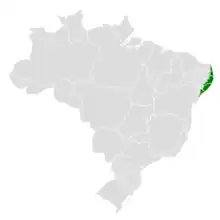| White-collared kite | |
|---|---|
 | |
| Scientific classification | |
| Domain: | Eukaryota |
| Kingdom: | Animalia |
| Phylum: | Chordata |
| Class: | Aves |
| Order: | Accipitriformes |
| Family: | Accipitridae |
| Genus: | Leptodon |
| Species: | L. forbesi |
| Binomial name | |
| Leptodon forbesi (Swann, 1922) | |
 | |
| White-collared kite range | |
The white-collared kite (Leptodon forbesi) is an Endangered species of bird in tribe Pernini and subfamily Perninae of family Accipitridae, the diurnal raptors.[1][3][4] It is endemic to northeastern Brazil.[3]
Taxonomy and systematics
Until the early 2000s the white-collared kite was considered an aberrant plumage of the grey-headed kite (L. cayanensis) but morphological and other evidence strongly support its treatment as a full species.[5] It is monotypic.[3]
The species' specific epithet commemorates the British zoologist William Alexander Forbes.
Description
The white-collared kite is about 50 cm (20 in) long and weighs 550 to 580 g (1.2 to 1.3 lb). Adults usually have a grey head with a white hindneck, but sometimes only the crown is gray and in other individuals the entire head is white. They have black upperparts, white underparts, and a black tail with a whitish tip and a broad ash-white band in the middle (or two white bands with a narrow black one between them). Their scapulars, secondaries, and inner primaries have broad white tips that are typically reduced or lost through wear.[6]
Distribution and habitat
The white-collared kite is found only in parts of four states of northeastern Brazil: eastern Paraíba, eastern Pernambuco, eastern Alagoas, and southern Sergipe. It primarily inhabits the Atlantic forest though it has been spotted over mangroves. In elevation it occurs from near sea level to 600 m (2,000 ft).[6]
Behavior
Movement
The white-collared kite is mostly sedentary but has been seen flying over sugar cane fields between isolated forest patches.[6]
Feeding
Essentially nothing is known about the white-collared kite's hunting methods or diet. During the one documented observation the bird swooped from a perch, caught prey thought to be an insect, and returned to the same perch.[6]
Breeding
The white-collared kite's breeding biology is almost unknown. Single birds and pairs have been observed making fluttering "butterfly" display flights between October and January, and an active nest was found in April.[6]
Vocalization
The white-collared kite makes a flight call "kua-kua-kua-kua" and "a cat-like 'eeeAAW'" during the display flight.[6]
Status
The IUCN originally assessed the white-collared kite as Critically Endangered but since 2017 has rated it Endangered. It has a very small and fragmented range and its estimated population of between 250 and 1000 mature individuals is believed to be decreasing. Most of its original habitat has been cleared, primarily for agriculture, and small-scale logging continues in some of the remaining fragments.[1] It is known from only about 30 sites, some of which are private preserves. Brazilian authorities consider it Endangered.[6]
References
- 1 2 3 BirdLife International (2018). "White-collared Kite Leptodon forbesi". IUCN Red List of Threatened Species. 2018: e.T22724659A132176387. doi:10.2305/IUCN.UK.2018-2.RLTS.T22724659A132176387.en. Retrieved 8 December 2022.
- ↑ "Appendices | CITES". cites.org. Retrieved 2022-01-14.
- 1 2 3 Gill, F.; Donsker, D.; Rasmussen, P., eds. (August 2022). "Hoatzin, New World vultures, Secretarybird, raptors". IOC World Bird List. v 12.2. Retrieved December 8, 2022.
- ↑ Mindell, M. D.; Fuchs, J.; Johnson, J. A. (2018). "Phylogeny, Taxonomy, and Geographic Diversity of Diurnal Raptors: Falconiformes, Accipitriformes, and Cathartiformes". In Sarasola, J.; Grande, J.; Negro, J. (eds.). Birds of Prey: Biology and conservation in the XXI century. Springer, Chame. pp. 3–32. doi:10.1007/978-3-319-73745-4_1. ISBN 978-3-319-73745-4.
- ↑ Remsen, J. V., Jr., J. I. Areta, E. Bonaccorso, S. Claramunt, A. Jaramillo, D. F. Lane, J. F. Pacheco, M. B. Robbins, F. G. Stiles, and K. J. Zimmer. Version 24 July 2022. A classification of the bird species of South America. American Ornithological Society. https://www.museum.lsu.edu/~Remsen/SACCBaseline.htm retrieved July 24, 2022
- 1 2 3 4 5 6 7 Bierregaard, R. O., D. A. Christie, G. M. Kirwan, and C. J. Sharpe (2020). White-collared Kite (Leptodon forbesi), version 1.0. In Birds of the World (J. del Hoyo, A. Elliott, J. Sargatal, D. A. Christie, and E. de Juana, Editors). Cornell Lab of Ornithology, Ithaca, NY, USA. https://doi.org/10.2173/bow.whckit1.01 retrieved December 8, 2022
Further reading
- "Gavião-de-pescoço-branco (Leptodon forbesi) | Aves de Rapina Brasil". www.avesderapinabrasil.com (in Portuguese).
